Louise Omer is on a worldwide, however extremely private quest: from Australia to Eire, Mexico, Sweden, Bulgaria and Istanbul. From Istanbul to Scotland, Italy, Germany, Morocco. And at last, to the cool waters of Džbán Lake within the Czech Republic.
In Holy Lady: A Divine Journey, former Pentecostal preacher Omer paperwork her seek for a female – and hopefully feminist – spirituality, leaving her marriage, her church, and life in Adelaide behind her.
She weaves collectively auto-ethnography, memoir and journey writing to craft a compelling commentary on the methods patriarchal norms inform Christian apply, limiting ladies’s expertise of spirituality and the divine.
Assessment: Holy Lady: A Divine Journey – Louise Omer (Scribe)
Omer frames Holy Lady with a collection of questions concerning the gendered nature of church expertise. She needs to grasp the male-centred tales and language Christians use to speak about God. She additionally needs to map connections between such language and gendered violence inside church buildings. As she goes, she attracts on social analysis, feminist principle and feminist theology.
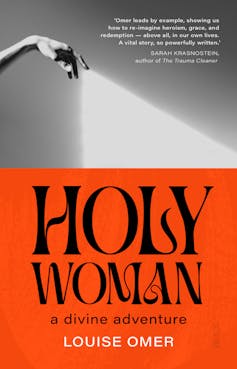
In her introduction, Omer notes a paradox of ladies and monotheistic faiths, such because the Pentecostal church she attended. Though these religion communities seem to restrict and even oppress ladies, ladies sometimes outnumber males – within the congregation, that’s. Not in senior management roles. Some ladies, like Omer, are given alternatives to evangelise or lead, however often underneath the supervision of a male minister or as a part of a husband and spouse ministry crew.
In Omer’s expertise – and in some ways my very own – if you happen to wished a platform from which to serve or converse in church there have been circumstances. As she places it, “Comply, and the stage is yours. Obey, and possibly someday you’ll be just like the Pastor.”
Given the patriarchal – and probably dangerous – teachings and buildings of such communities, why do ladies keep? Why do they outnumber their male counterparts? Can a girl really have company, be a feminist, and be devoted?
Omer just isn’t the primary to grapple with this paradox, or with the questions which spring from it. They floor steadily in research of lived faith, in addition to within the fashionable works of evangelical writers rethinking the strict gender-complementary norms they as soon as adhered to.
Nonetheless, Omer’s e-book just isn’t a examine of lived faith, or a gross sales pitch for any type of egalitarian, feminist or constructive Christian theology. For Omer, questions precipitated perception to crumble. What Omer provides readers is an prolonged, intensely intimate exploration of how gender, faith – and sadly, violence – go away marks on the physique.
In Omer’s phrases,
My journey was self-focused, obsessive about interior expertise. Deeper than naval-gazing, this was vulva gazing: I wished to look at the impression of misogynist ideology on my most intimate elements.
Her gazing results in a post-traumatic remaking of id and spirituality.
Learn extra:
COVID modified journey writing. Possibly that is not a foul factor
At 15, Omer – who was raised an atheist in suburban Adelaide – longed to seek out her place on the earth, and was able to consider. Christianity, which she first encountered via a charismatic college pastor, changed her childhood perception in magic. Omer explains,
Jesus additionally gave me eyes to see. […] Nothing was unattainable, as a result of he held God’s miraculous energy in his fingers, and I might, too. This lined up with my conviction that the world was inherently magic. The seen and the unseen; the attainable and unattainable.
Feeling misplaced at house and college, church was a refuge. The early years of bible examine, youth group, and a spotlight from church leaders supplied an thrilling new non secular and social world.
Earlier than and after marriage
Contents
The springboard for Omer’s non secular – but fleshy and sexual – pilgrimage out of church life is the tip of her six-year marriage (aged 22) to a Christian pastor, whom she met at a church Battle of the Bands after they have been youngsters. Structurally, the e-book circles round Omer’s marriage: every part is marked as both “after” or “earlier than”. Omer’s journeys into the previous make it clear her love for her husband and for God have been interwoven.
Accordingly, as Omer strikes between occasions, she seamlessly strikes between private questions and their wider implications; the unravelling of a wedding melts into the unravelling of a tidy, conservative religion.
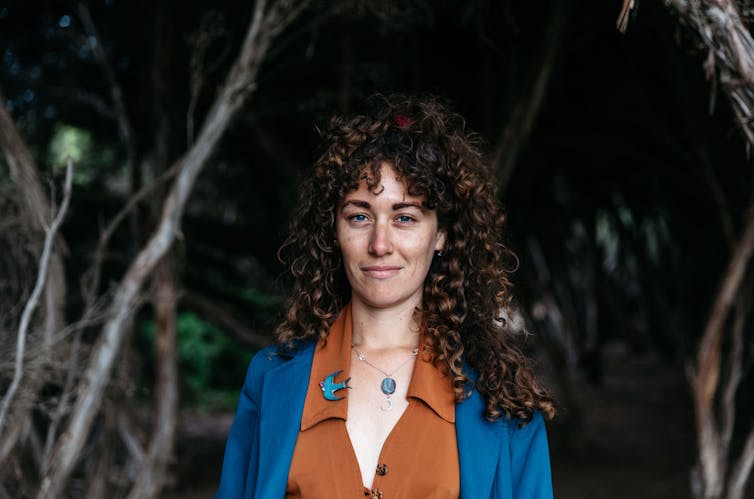
Sia Duff, Creator supplied
In contrast to the tidy solutions of Pentecostalism, Omer’s questions and solutions are essentially messy. Regardless of seeming to crave firm and belonging, Omer goes on a solo journey, and doesn’t seem to immerse herself for lengthy durations of time in anyone neighborhood. Her loneliness is, maybe, her most constant companion.
She encounters Celtic goddesses, joins an eight-hour in a single day pilgrimage to face earlier than La Virgin de Guadalupe, meets ladies clergymen and gender numerous parishioners, and makes a probably dangerous tryst in Morocco. Omer notes that:
My analysis strategies have been haphazard and conceited: I grabbed onto the ghost of an thought and purchased airplane tickets, then chased it via a rustic the place I didn’t belong
This method is each a energy and a weak point.
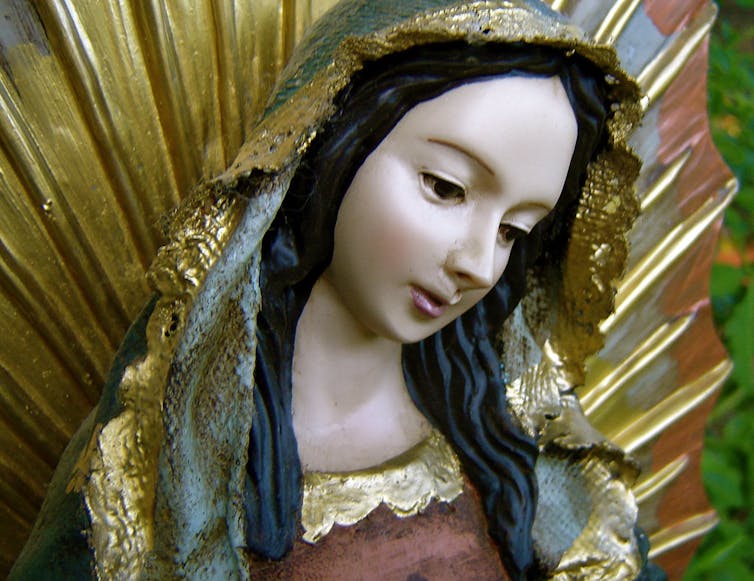
Andreanna Moya Pictures/Flickr, CC BY
Omer’s openness to haphazardly chasing concepts frees her to journey to many locations, to fulfill and interview individuals from an array of traditions. However her “conceitedness” clouds her observations.
Typically it appears as if, similar to the neighborhood (and husband) she has left, which undermined the voices and experiences of ladies, Omer is dismissive of, and disenchanted by, the assorted Christian practices she sees. At occasions, Omer’s disappointment stunned me.
Enthralled, I wished to face with Omer by the “immeasurably deep” water of St Brigid’s shrine and obtain a blessing. I longed to sit down with the Brigidine nuns Omer had met, as they engaged within the quiet every day act of “tending” Brigid’s flame. I utterly missed Omer’s disappointment till she explicitly acknowledged it.
Learn extra:
Islam and feminism are usually not mutually unique, and religion might be an vital liberator
Unholy acts of spiritual males
Regardless of the questions posed within the opening, the query that really appears to propel Omer’s work doesn’t seem till a 3rd of the best way in: “what precisely was I working from?”. Holy Lady: A divine journey might in any other case have been subtitled “the unholy acts of spiritual males”.
Though Omer’s pilgrimage is framed as a journey in the direction of female spirituality, it is usually a strong testimony about (rightly) working from a spot of emotional and non secular hurt by the hands of highly effective, authoritative spiritual males.
As Omer’s narrative progresses, it turns into obvious her search is much less for a female spirituality “on the market” than for an inner sense of cohesion and authenticity. The feminine and gender-diverse leaders, tales and statues inside Christianity are usually not Omer’s vacation spot.
Omer is journeying towards a re-made self on the opposite aspect of a Christianity that led her to consider she was lower than her husband and to worship him as a proxy for God. And that conditioned her not solely to just accept male violence, however to forgive it.
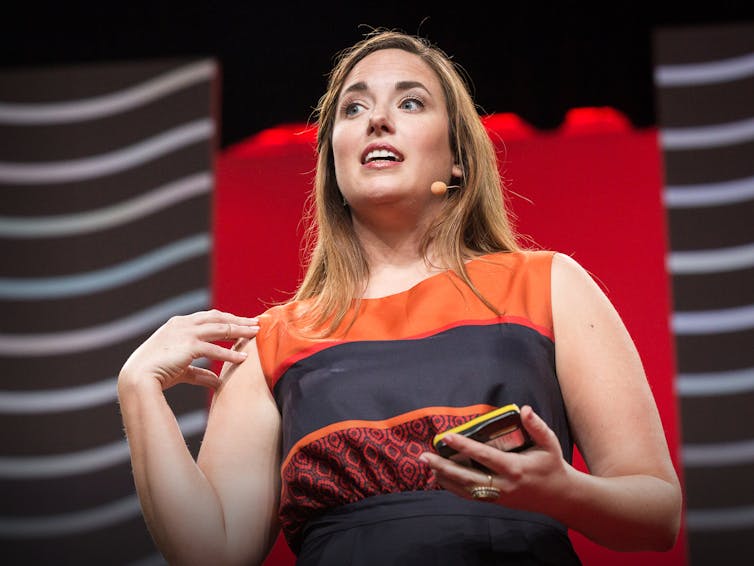
Ryan Lash/TED, CC BY
The truth is, it led her to see male violence as concurrently unattainable and fully regular. Beneath the divine journey is the complicated, private expertise of non secular hurt and remaking.
Given Omer plots her personal path away from conservative Christianity, my concern is it could be straightforward for some inside Christian communities to misuse Holy Lady as a cautionary story towards ladies.
My weary, feminist and still-Christian ears can virtually hear a captivating preacher warning us to remain near the authorized path, keep away from questions and liberal theologies, or else you too may doubt God and end up in a complicated, and so-called “sinful” sexual encounter in another country. This might be a misreading.
Learn extra:
Spiritual lies, conmen and coercive management: how cults corrupt our need for love and connection
Towards the tidy solutions of charismatic preachers
If Holy Lady is a cautionary story, it cautions readers towards the graceful, straightforward, comforting phrases of a charismatic preacher and the tidy solutions present in non secular acquiescence. It’s a warning towards spiritual coercive management.
Like leaving a wedding, leaving a religion neighborhood might be arduous work. My favorite feminist theorist, Sara Ahmed, teaches us “it’s arduous labour to recognise disappointment and disappointment when you find yourself residing a life that’s meant to be pleased, however just isn’t pleased.”
It’s arduous, lonely work to confess the religion and marriage you believed would make you cheerful and protected are literally inflicting unhappiness and hurt. Ahmed reminds us it’s typically feminist books that assist us to call and course of issues.
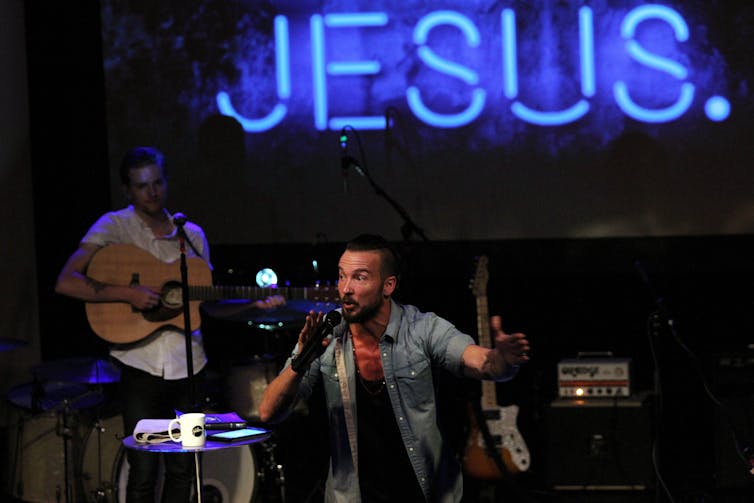
Tina Fineberg/AP
Books can preserve us firm. For a lot of readers, Holy Lady could show to be the corporate they want, as they carve out a protected and inclusive non secular house, both inside or with out Christianity.
For these unsure about conservative religion, and starting to go looking out one thing totally different, Holy Lady could increase new questions and provide glimmers of risk. For anybody navigating the parallel passage out of a wedding and a religion neighborhood, Omer’s e-book shall be a welcome learn, and a companion textual content on that street.
Holy Lady is a obligatory antidote to what generally is a lonely journey out of an unhealthy and unsafe relationship, too. Omer encourages us to confidently persist on the street to holiness and wholeness – wherever that street leads. Could you journey it effectively, with different holy ladies, and Holy Lady.
Supply By https://theconversation.com/holy-womans-fleshy-feminist-spiritual-pilgrimage-is-a-warning-against-religious-coercive-control-185388